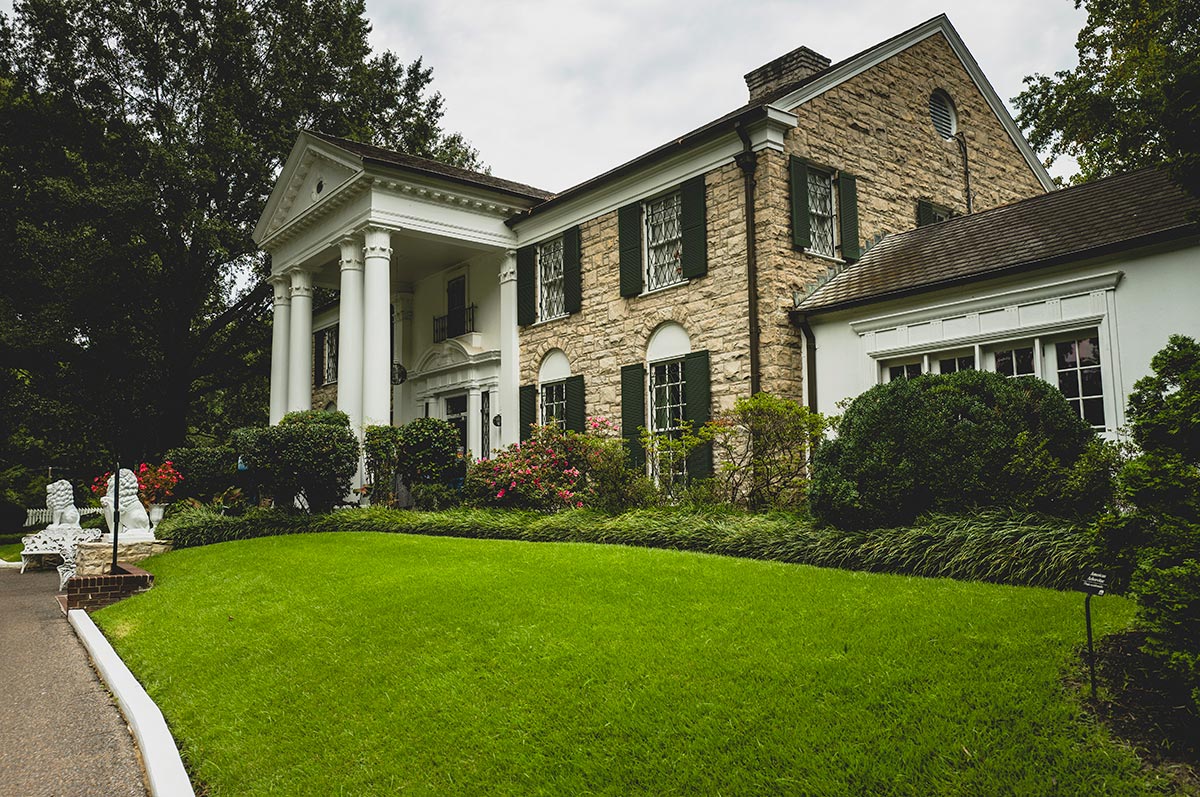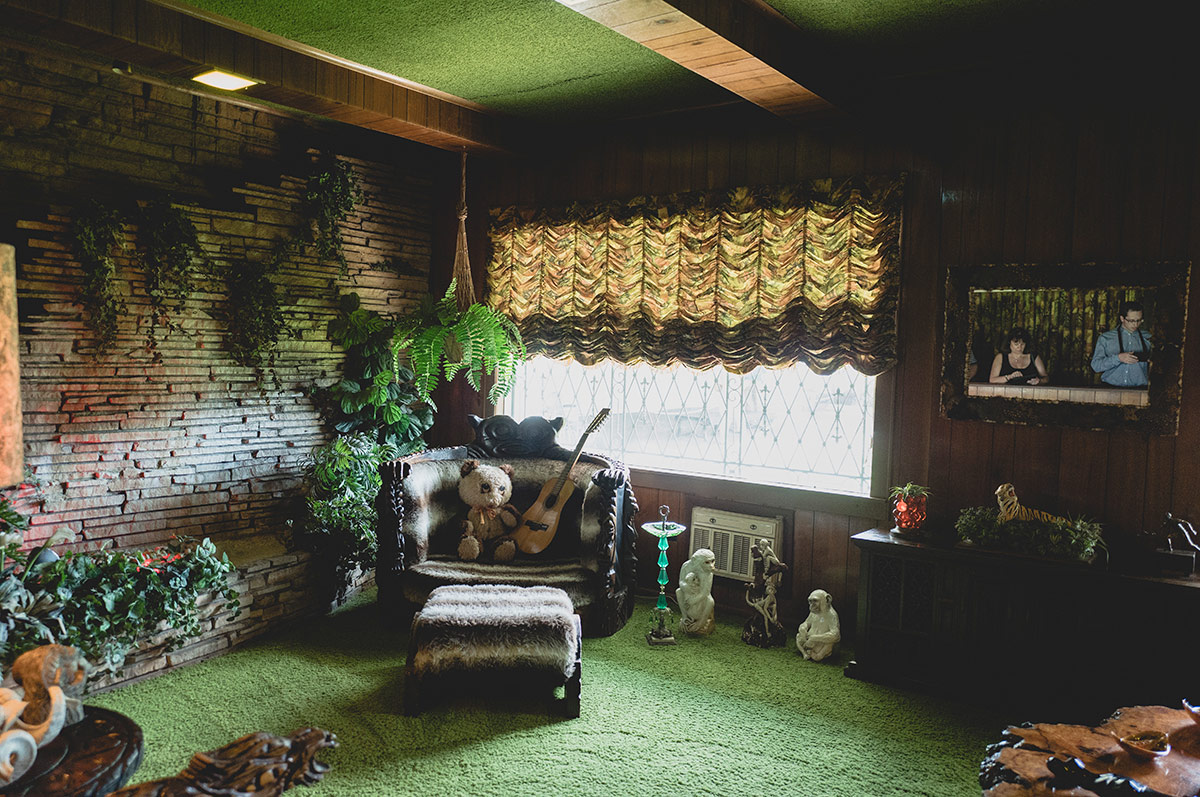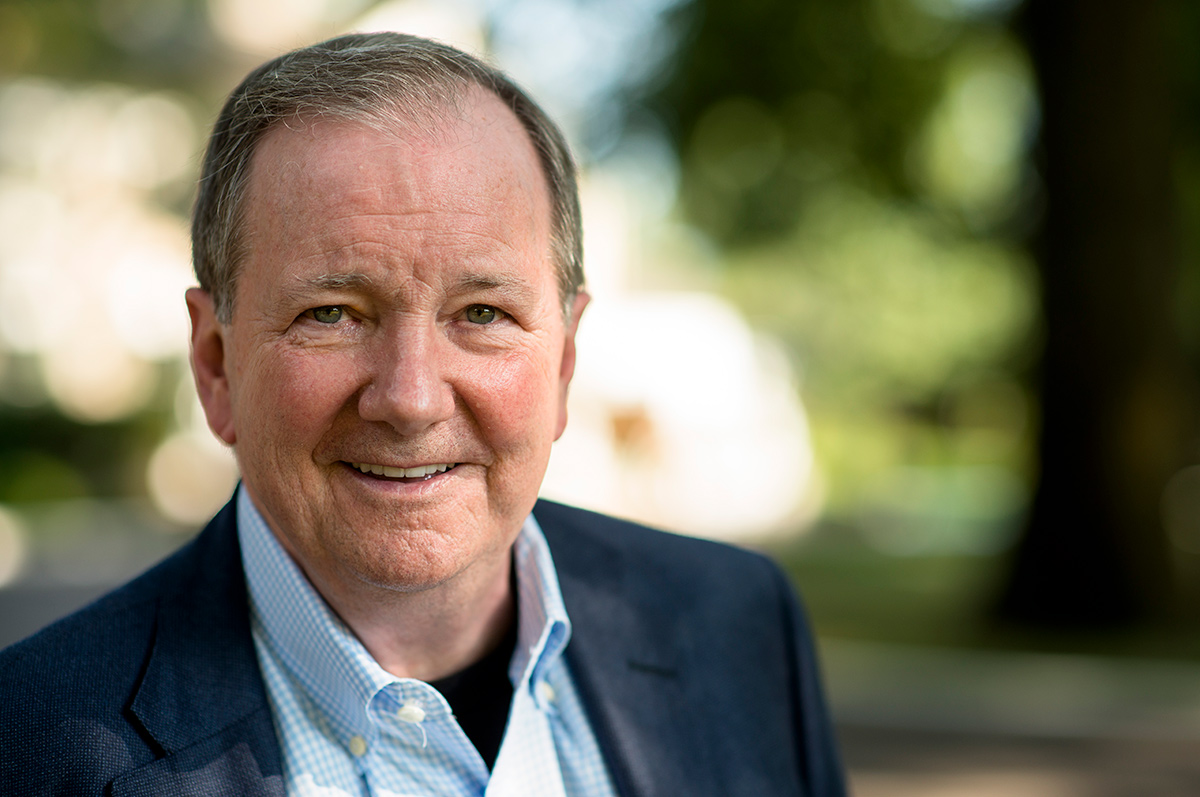Keeper of the King
Meet the Regis grad who saved the iconic home of Elvis Presley
Jack Soden was a Regis graduate working in finance when Priscilla Presley walked into his life.
It was a few years after the 1977 death of Elvis Presley, the American music icon and Priscilla’s ex-husband. Priscilla was a co-executor of Graceland, Elvis’ estate on the outskirts of Memphis, Tenn., where members of Elvis’ family still lived. Graceland was hemorrhaging money, and Priscilla was being advised by myriad voices, including her co-executors, to sell the property.
“When I said we can’t do that, [I was told] basically that Elvis in six months would be forgotten,” Priscilla Presley said. “I think those words penetrated so deep into me, [and I said] this is never going to happen. There’s no way Elvis Presley can be forgotten. Certainly, we cannot sell his home that he so dearly loved and said he would never sell.”
Presley held tightly to the idea that she could keep the home and maybe even open it up to visitors. With nearly all voices still telling her to sell, she found a sympathetic ear in an unlikely figure: Soden, a former English major who had never worked in tourism.
“He’s just got that instinctive nature,” Priscilla Presley said. “God, I couldn’t even think of anyone else I could have hired or [partnered with] to get this done. ... He just takes care of business, and that’s what Elvis did.”
Nearly four decades after Soden’s and Presley’s vision became reality, Soden stands as the only CEO Graceland has ever had and the only person Presley trusted to protect Elvis’ treasured home. While ushering in more than 20 million visitors since the property opened, Soden has guided Graceland toward its current spot in the pantheon of American music and culture.
Soden knows his wild ride might not have happened without optimism, perseverance, good fortune and a stop at a place called Regis University.
A Dose of Jesuit Philosophy
Soden grew up the son of an investment banker in a Kansas City, Mo., Catholic family. He attended a Jesuit Catholic high school in his hometown alongside his brother, and the pair had a few friends from Kansas City who had gone on to Regis after graduation.
To the Soden boys, the idea of going to college in Colorado was an all-too-attractive one. Both brothers settled on Regis, and although Jack planned on going into his father’s investment banking firm, he decided to major in English and minor in sociology.
“I’ve had a pretty good experience with the value of liberal arts, being a decent writer and communicator,” Soden said.
It was at Regis that Soden met the men who would become his best friends. The group called themselves the “Theta Betas,” rented a house together on Gaylord Street near City Park in Denver and traveled up to the mountains for ski trips. They spent time with friends from nearby schools such as Loretto Heights College, whose nursing program was the foundation for what is now Regis’ Rueckert-Hartman College for Health Professions.
Soden looks back with thankfulness on his time at Regis and the open-minded outlook it gave him.
“You could obviously tell that the Jesuit theology was outside the box,” he said. “As young students, we were invited to think about situational ethics et cetera, as opposed to, ‘This is the Ten Commandments. Read it and don’t forget it.’”
While graduating and considering his next steps in the spring of 1968, Soden faced a turbulent world. The Vietnam War and protests against it were in full swing, and Martin Luther King Jr. had recently been assassinated in the midst of the Civil Rights movement. Riots sparked by King’s death were breaking out across the country, and the political world was bracing for a tumultuous election. The future for a new college graduate looked uncertain.
“It couldn’t have been a better time [for me] to have had a good dose of Jesuit philosophy and theology. ... It was a time in dire need of clear thinking and optimistic thinking," Soden said. "I think the Regis education had a lot to do with how we got through it.”
“You should’ve seen the view out the windshield in 1968,” Soden said. “Clear to the horizon, it looked like toothpaste that couldn’t possibly get back in the tube.”
Despite this bleak outlook, Soden stayed optimistic — in part, he says, because of the foundation in liberal arts and Jesuit values he gained at Regis.
“It couldn’t have been a better time [for me] to have had a good dose of Jesuit philosophy and theology. ... It was a time in dire need of clear thinking and optimistic thinking. I think the Regis education had a lot to do with how we got through it.”
Years later, that positivity would pay off. Soden found his way into the finance industry in Kansas City, where his father had worked for years, and tried his hand at being a stockbroker. It didn’t stick.
“Sitting on the phone trying to sell a hundred shares of Iowa Power and Light to a little old lady just made me crazy,” he said.
Still, he persevered in finance and eventually found a foothold with financier Morgan Maxfield — and that’s when his path met Priscilla Presley’s.

From Mansion to Monument
Presley had been introduced to Maxfield and Soden in Los Angeles, with the hope that they might be willing to support her idea of opening Graceland.
“The more time I spent with Jack, the more I liked him,” Presley said. “I just liked his positivity. He had such a bigger outlook than anyone I had talked to before. ... It was always optimistic. ‘We can do this.’”
Around that time, Maxfield was killed in a private plane crash. That left Soden as Presley’s central voice of hope that Graceland could work as a business.
“How tough [could] it be?” Soden remembers saying. “Once again, it was optimism. Now in retrospect, I’ve always laughed that it was easier to be optimistic if you didn’t know enough to be afraid.”
There was only one problem. Soden had grown up on music from bands like the Beatles, and one day he made a confession to Presley: He wasn’t much of an Elvis fan. To Presley, that wasn’t an issue.
“Any kind of fan, I think they would be too emotionally involved,” Presley said. “I don’t think they could step back and see the bigger picture or make decisions that needed to be made. I needed a voice of reason.”
So Presley asked Soden to meet her co-executors, Elvis’ accountant and a representative from the National Bank of Commerce. It wasn’t long before Soden’s optimism won them over, but they were skeptical that an outsider — an English major from the Midwest — could help get Graceland the attraction off the ground.
“They told me later that it was an absolutely ridiculous idea on her part [to bring me in],” Soden said. “I was born and raised in Kansas City. I knew nothing about tourism or music. I’d already said I wasn’t an Elvis fan.”
With Presley finally having found someone who believed in her vision, she and Soden began touring the homes of other famous figures that were being run as tourist attractions: Thomas Jefferson’s Monticello and George Washington’s Mount Vernon in Virginia, the Biltmore mansion in North Carolina and even the Thomas Edison House in New Jersey. Presley’s favorite was Hearst Castle in San Simeon, Calif. The home of publishing tycoon William Randolph Hearst was operated in the way she hoped Graceland would be — with everything left as it originally was.
With notes in hand from each of these home tours, Soden devised a plan for opening Graceland. He and Presley remember having no idea how many fans would show up the first day.
“You’d expect maybe that the diehard fans would be there, but it was the future we didn’t know,” Soden said. “But they came in great numbers and they kept coming.”
With a healthy dose of optimism and 14 Dodge vans to shuttle visitors, Graceland opened to a strong crowd on the Monday morning of June 7, 1982. During the following weeks, tours were so well attended that in just over a month, Soden and Presley made back the full $500,000 investment they had secured to open Graceland.
“The more time I spent with Jack, the more I liked him,” Presley said. “I just liked his positivity. He had such a bigger outlook than anyone I had talked to before. ... It was always optimistic. ‘We can do this.’”
Since then, Graceland has become a staple of American culture, with references abounding in songs, television shows, feature films. It has been visited by presidents Jimmy Carter and George W. Bush, musicians Paul McCartney and Taylor Swift, and athletes Peyton Manning and Muhammad Ali. In November 2018, Soden accepted the Presidential Medal of Freedom on Elvis’ behalf at the only house in the nation that receives more yearly visitors than Graceland — the White House.
Even foreign dignitaries have made the trip to Graceland, including Prince Albert II of Monaco, Prince William of England and former Costa Rican president Oscar Arias. In 2006, the same year Graceland received National Historic Landmark status, Japanese Prime Minister Junichiro Koizumi made a joint visit with then-President George W. Bush.
“The prime minister, we knew he was a huge Elvis fan, and he was just beside himself,” Soden said. “He was so excited. It’s times like that that would just make you go, ‘Man, I wouldn’t miss this for the world.’”

Taking Care of Business
In his 37-plus years at the helm of Graceland, Soden has overseen a dizzying amount of expansion. He and his Elvis Presley Enterprises team bought the strip mall across the street from the property, where businesses had used Elvis’ name and likeness to hawk merchandise of all kinds. Soden also bought back Elvis’ 1958 Convair 880 airplane, named Lisa Marie after Elvis’ and Priscilla’s daughter, to display at Graceland.
In the past five years alone, Soden oversaw the $137 million expansion of the Graceland campus, which now includes a 450-room resort hotel, multiple museums, retail space, restaurants and more. The museum space includes Elvis’ vintage cars, a wall covered in his gold records and a collection of the custom suits he wore to perform on various grand stages.
“It’s just kinda interesting to have your CEO as a thought partner in your day-to-day work,” said Christian Ross, Graceland’s public relations and marketing specialist. “You don’t get that probably anywhere. [Even with] something this massive, he’s literally involved in everything here.”
None of the expansion at Graceland has happened without Soden’s hand in it.
“It’s just kinda interesting to have your CEO as a thought partner in your day-to-day work,” said Christian Ross, Graceland’s public relations and marketing specialist. “You don’t get that probably anywhere. [Even with] something this massive, he’s literally involved in everything here.”
Soden finds time to serve on boards for business and human service organizations, including for multiple hospitals. He and his team also helped attract funding for Memphis’ National Civil Rights Museum.
“He’s not ego-driven,” Presley said. “I don’t know if Jack even has an ego, to be honest with you.”
Perhaps Soden’s most impressive accomplishment is realizing his vision to preserve the spirit of Elvis more than 40 years after the music legend’s death. Much of the effort to preserve that legacy comes through in the way Soden operates his business.
“Elvis was about entertainment. He had a sense of humor. We’d say way back that Graceland ought to be a fun place to work,” Soden said. “And if it’s not, we’re not doing it right.”
Presley notes that when she loses perspective on things, Soden is the person she calls to be her voice of reason.
“He’s just got that instinctive nature,” Presley said. “God, I couldn’t even think of anyone else I could have hired or [partnered with] to get this done. ...He just takes care of business, and that’s what Elvis did.”

Lightnin' Round with Jack Soden
Favorite Elvis Song: “As Long as I Have You”
Favorite Celebrity Ever Hosted: Trisha Yearwood
Favorite Spot at Regis: The lawn between Carroll Hall and DeSmet Hall, where my friends and I would spend hours throwing the Frisbee. Or the “Pink Palace” (Main Hall). There used to be an orphanage for boys in that building, and after my grandfather was orphaned, he lived there for two or three years.
Strangest Question at Graceland: Is Elvis still alive?
Favorite Room in the Mansion: Jungle Room
Most Important Values: Honesty, integrity, doing the right thing. Without those things, nothing seems to matter.
Favorite Thing About Denver: The climate and the view of the mountains.
Advice to Regis Students: Be optimistic about the future. Being an optimist means you’re always going to win in the end. And come visit Graceland!